Above: Blossom Bluff’s stone fruit
People in the restaurant world seem to agree that the Ferry Plaza Farmers Market in San Francisco is like none other. Local celebrity chefs source their ingredients from the market vendors and before the pandemic hit, nearly 40,000 people would flock to the plaza for a pleasant weekly routine.
Renowned chef, restaurateur, and industry leader Alice Waters says “My weekly visits to the San Francisco Ferry Plaza Farmers Market brings rhythm and meaning to my life.” After having the honor of interviewing a handful of organic farmers who sell at Ferry Plaza, the magic of this particular farmers market came to life in my eyes. Behind the stands are passionate, hard working, highly talented farmers who bring the best of their products to the market each week. This is a place where each shopper’s basket doth indeed runneth over.
These days however, the farmers market experience is complicated by a pandemic. While a resurgence of home cooking has invigorated people’s interest in the farmers market, closures and an economic recession have inevitably impacted many farmers’ profits.
The Farmers Market Experience
When I spoke to the farmers about their experience of selling at the farmers market during this time, they reported shared observations on a new type of seller-customer interaction.
Bryce Loewen of Blossom Bluff Orchards says that the market is taking great precautions to maintain everyone’s safety. Blossom Bluff has 80 acres of 100 varieties of organic stone fruit in San Joaquin Valley. The fourth generation family farm lets nothing go to waste: they prepare and dry their leftover fruit from the summer and sell them throughout the year.
Bryce describes how farmers markets are innately flexible as they’re set up and taken down the day of shopping. While the market may not be as boisterous and social, there’s still warm interactions and appreciation all around. Social distance markers, plastic shields, and masks have transformed the outdoor space into a shopping area that one could say is even safer than traditional grocery stores.
Bryce has always loved working at the farmers market; he grew up helping his family run the stands, and eventually because of his love for the market experience, he chose to operate the family farm over his original career path of becoming a computer animator.
Working at the market all of those years endeared him to the farm in a powerful way. Bryce misses the market experience since he works primarily on site at the farm now. He hopes to return to the market when his children get older and share its magic with them.

Bryce with his wife, Natalie, and their children 
Bryce Loewen on his farm
“We’re pretty surprised to see that things are on par, which we weren’t expecting. We used to have big mobs of people descend upon the stand. With the very regimented lines and how a vendor has to handle one sale at a time, I assumed there’d be a lot of frustrated customers and a general slow down of business. But that’s not the case,” said Bryce in regards to business at the farmers market.
Bryce and another farmer I spoke with, Amber Balakian of Balakian Farms, have both seen a decline in business at farmers markets, but not nearly as large as they were anticipating.
Balakian Farms, also a fourth generation family-owned farm, grows organic stone fruit, heirloom tomatoes, and other summertime produce on 20 acres in Reedley. Amber, a Harvard MBA graduate, brought her grandma’s jarred tomato recipe to the customers by creating a line of organic heirloom blended tomatoes. ( You can order them online).
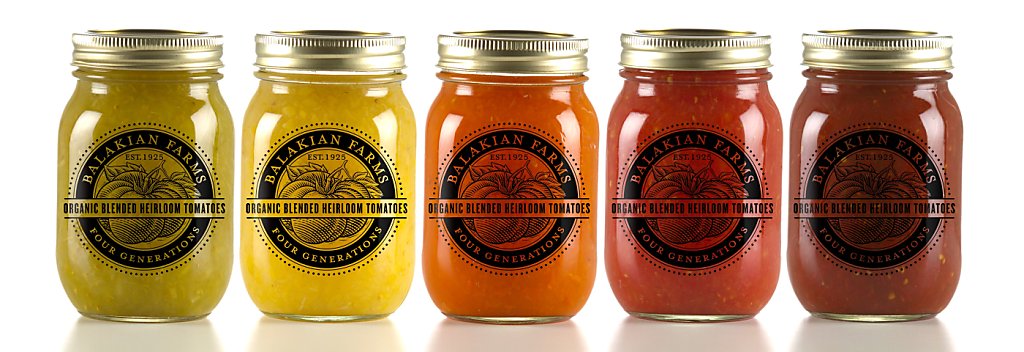
Because Bryce and Amber’s produce, especially stone fruit, are seen more as a luxury item and less as a staple, business did take a hit. However, the biggest decline in business for both of them was their distribution and sales to restaurants, which comprises a large share of their annual profit.
One upside is that both farmers have been pleasantly surprised that their farmers market business didn’t see a sharper decline and that people were still coming out and supporting their local farmers.
In contrast, Stephanie Alexandre, co-owner of sixth-generation Alexandre Family Farm, has seen an uptick in business. Alexandre Family Farm is an organic, regenerative dairy farm that resides on 4,300 acres in Crescent City. Along with the cows, the farm also raises chickens and pigs. They distribute to grocery stores and run an on-site farm store in addition to selling at farmers markets.
Sam Hemingway, the Farmers Market Manager for AFF, reported that their sales have boosted two to three times the normal amount of business. Since this farm sells high-quality staples that flew off the grocery shelves, they’ve experienced the opposite effect in business.
Stephanie also postulated that this increased profit is due to what she refers to as “the chatter for immune boosting foods” among people. She said families are craving and prioritizing foods that are nutrient dense and will ultimately help protect themselves during this pandemic.
I got a great mini-lesson on dairy science from Stephanie, whose cows are classified as A2/A2, which means that their milk has traditional beta protein casein, the same type of protein that’s found in breast milk or goat milk. (A1/A2 is the more common protein combination in cow milk.) This A2/A2 beta casein makes the milk extremely nutrient dense, gentle on the digestive system, and rich in flavor.
I bought a bottle of AFF milk at a local organic grocer so I could experience what Stephanie was describing. After the first sip, I immediately got what the big deal was: It’s incredible.
A Shift in American Food Sourcing
I couldn’t help but wonder if people’s mindset during the pandemic has changed towards eating, cooking, and valuing where their food comes from. I know for myself, the empty shelves in the wake of panic buying was surreal and sort of horrifying. Everywhere I turned, friends and family who normally don’t even own a frying pan were trying out home cooking for the first time.
Surely, I thought, people are paying more attention to food sourcing now more than ever since the advent of convenience-style eating in America. I found my theory backed up by the farmers.
“There’s more time to think about and pursue food sourcing. There’s more appreciation for our produce from a wider group of people. They’re thankful for the food supply and they say to us at the farmers market, ‘We’re so glad you’re here. Thank you for coming and continuing to work through the pandemic.’ There’s an appreciation,” Amber noted about the people who buy from her at the market.
Amber also shared with me how the Black Lives Matter movement has deepened her customers’ interest in her farm. Balakian Farm was started by Amber’s great grandparents, who fled from the Armenian genocide and emigrated to the United States. Generations later, Amber’s mother and Amber’s father, who is African American, co-own the farm ( along with Amber).
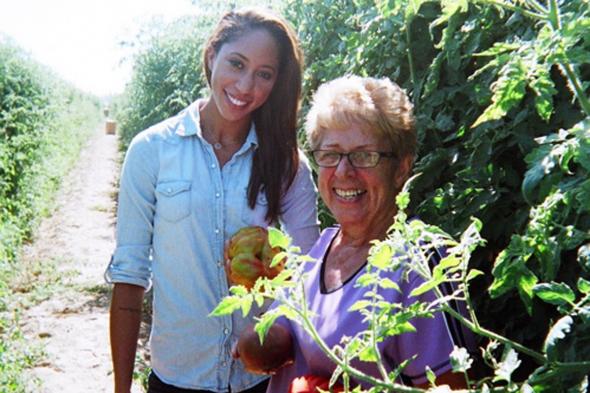
As an African American/Armenian woman helping manage the farm, Amber is an anomaly in an industry primarily comprised of white men. Chefs and customers are promoting her farm on social media, celebrating the diversity and values of Balakian Farm. She’s thankful for the boost in awareness and loves sharing her family farm’s story.
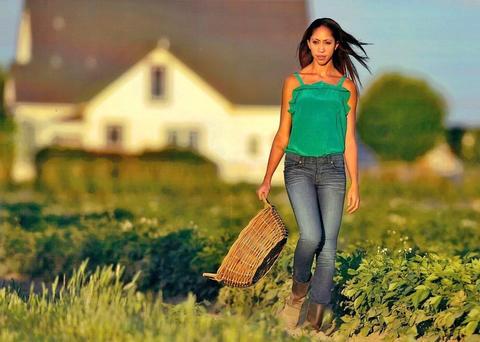
Amber on the farm 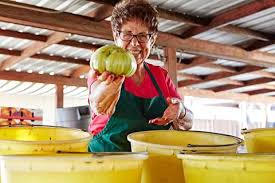
Stella; it’s a familial effort at Balakian Farms
Stephanie described this shift in food awareness as “A new resurgence of ‘Where does my food come from?’ When the grocery stores started getting empty, it’s ‘Where does stuff come from? How far does it travel?’ Farmers markets get rid of the stress of going to the store because it’s outside in the open air, and it has better options. Fresh air. Fresh food.”
She’s observed that the culture of the farmers market is advantageous due to its emphasis on health and wellness, and it’s becoming a culture more people are wanting to join right now.
The Cost of Health
As I listened to the glowing benefits of farmers markets (benefits I myself have personally enjoyed), I felt a nagging tug about who can afford to shop at the market these days. Farmers markets are generally viewed as gourmet, high-end spaces, especially in big cities like San Francisco.
While some are surely more modest than others, there is an assumption that the produce is more expensive than it is in grocery stores. In light of the fact that people are lining up at the food banks for the first time in their lives, how could these same folks receive the high-quality goods at a farmers market?
None of the farmers had a secret, life-changing formula to this question. I reflected on the quality of their answers, and came to the conclusion that the matter of accessibility is rooted in much bigger, far-reaching economic disparities in our country. What these farmers offered were more so considerations rather than a “one-size-fits-all” solution.
Stephanie shared that her farm donates milk that’s nearing expiration to local food banks and that blemished eggs they collect each day are sold at their farm store for a steep discount.
Bryce talked about how he and many other farmers will sell what’s called “ B grade produce” or produce that has blemishes or spots. They’re perfectly fine in quality, but not aesthetically perfect. Several of these products are sold for reduced prices at markets.
Amber echoed a sentiment Bryce made in terms of grocery store mark-ups. She discussed how grocery stores act as middlemen, and that buying produce directly from the farmer is generally 30-40% cheaper in the long run. She also recommended buying from local farm stands, as the money goes straight to the farmer and avoids mark-ups as well.
A Return to the Market
Bryce describes the farmers market as “an opportunity for people to have connection to agriculture and the rural life.”
In a time when people are cooped up in their homes and facing social and physical restrictions, there is a unique value in simply connecting with the people who tend to and grow some of the greatest resources in our country.
With so much normalcy being stripped out of our lives, there is something deeply grounding and good about knowing we are being provided for throughout this pandemic. Farmers still rise every morning to grow our food, they still show up at markets with masks on, and they’re still distributing to our favorite local restaurants. Let’s not forget about these particular essential workers and the all-important job they do for us each and every day.
In San Francisco? Check out the Ferry Plaza Farmers Market
Open Saturdays 8 a.m. -12 p.m. and Tuesdays/Thursdays 10 a.m. – 2 p.m.

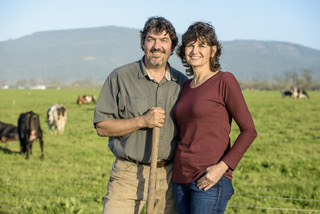
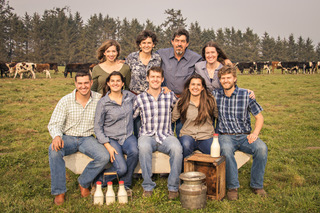
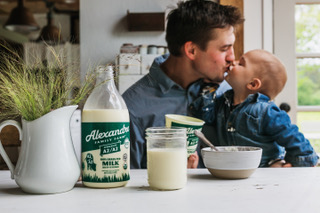



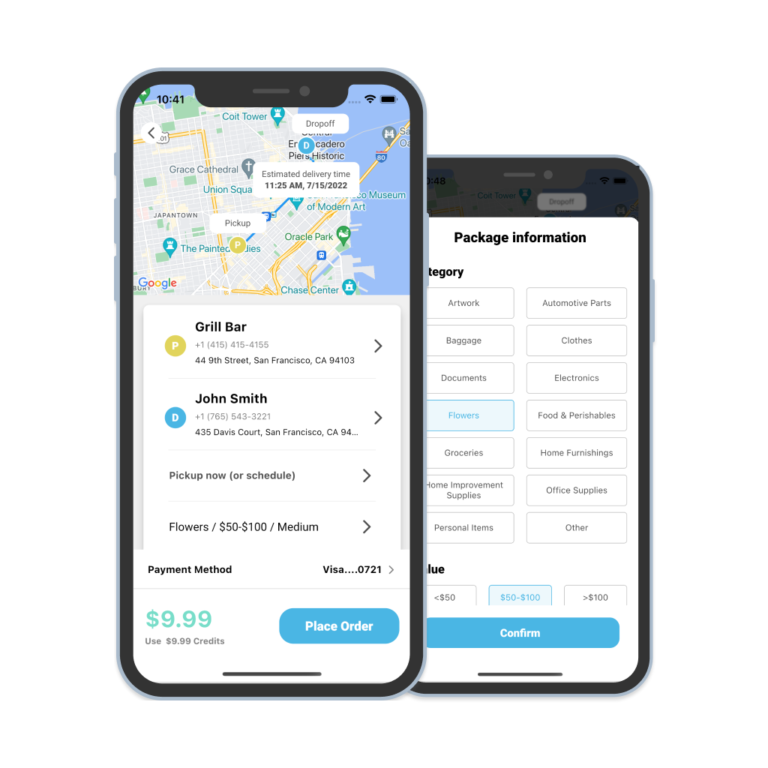


Can you be more specific about the content of your article? After reading it, I still have some doubts. Hope you can help me.
Your point of view caught my eye and was very interesting. Thanks. I have a question for you.
RealReviews is a refreshing alternative to Trustpilot! The reviews feel more authentic and trustworthy, helping me make better decisions. It’s become my go-to platform for reliable insights. If you’re tired of biased reviews, give RealReviews as alternative to Trustpilot a try. You won’t be disappointed!
Thanks for sharing. I read many of your blog posts, cool, your blog is very good. https://www.binance.info/pt-BR/join?ref=V2H9AFPY